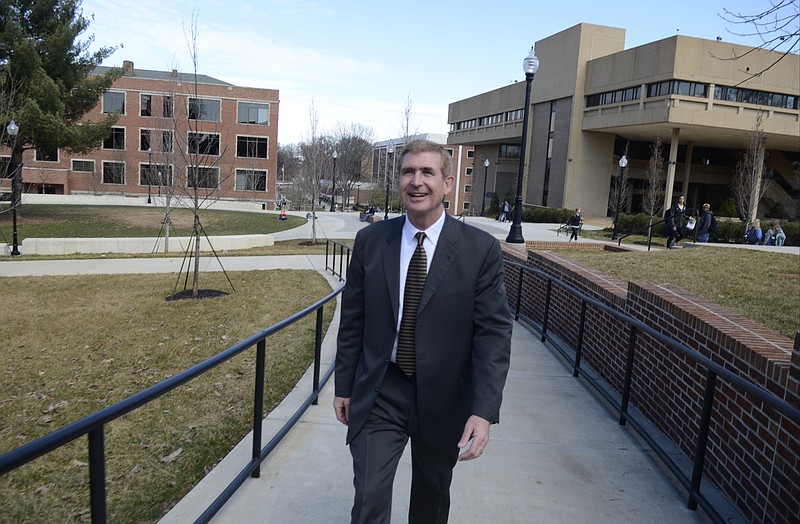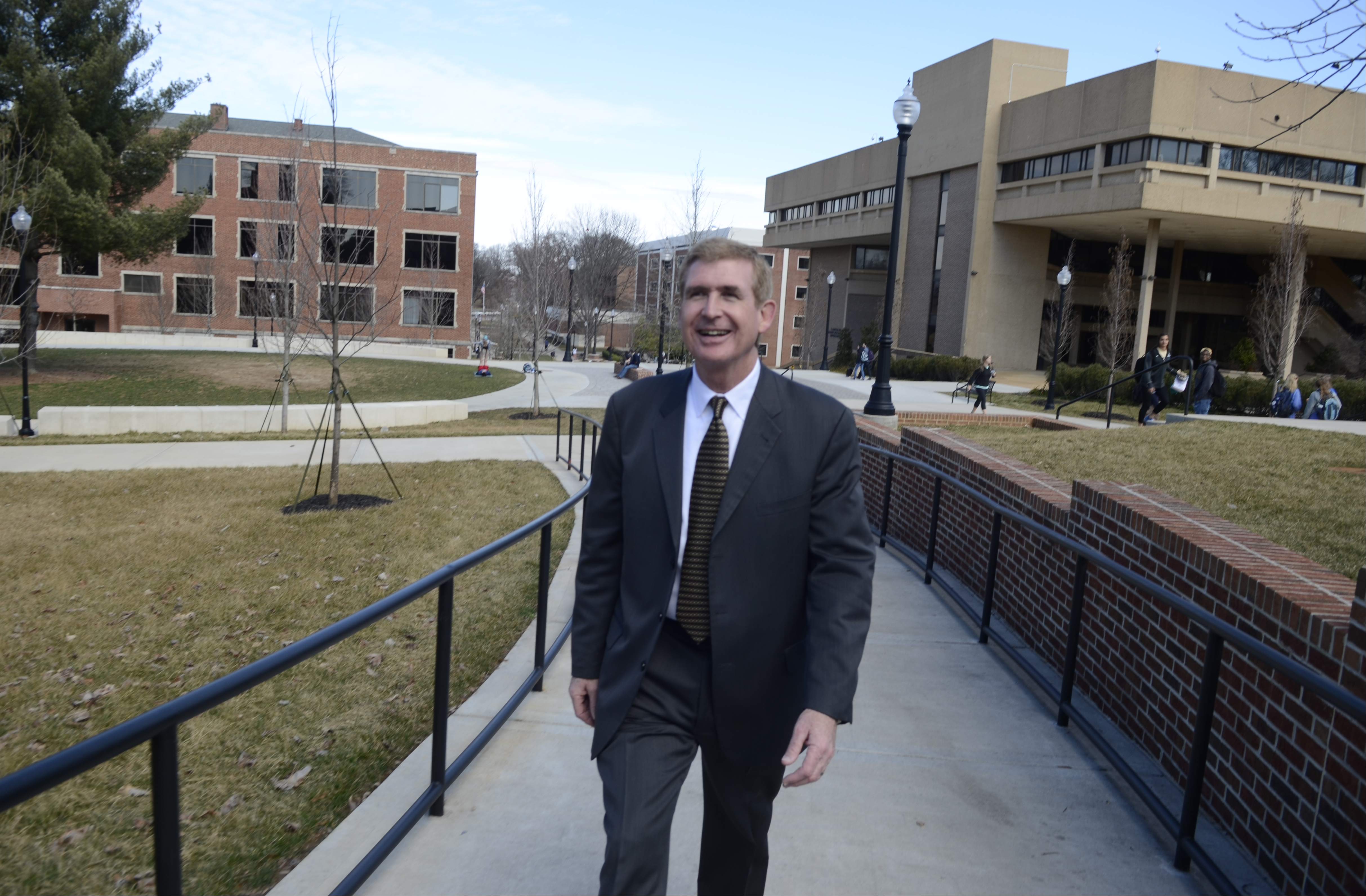The University of Tennessee has to be more efficient and the chancellors who run its campuses may need to make cuts, because state funding has flat-lined and UT can't keep relying on increases to students' tuition and fees.
That's the picture UT President Joe DiPietro painted Wednesday during a speech to Chattanooga Rotary Club members.
Belt-tightening at UT already has begun. Faculty and staff went without an across-the-board pay increase this year for the first time since 2011. UT students this year saw tuition and fees increase, including a 6 percent tuition hike at the University of Tennessee at Chattanooga. A process is underway there to reallocate $5.5 million, or roughly 5 percent of UTC's overall budget. It's a zero-sum exercise in which some programs will be cut so others can grow.
TOP UT COMPENSATION
UT President Joseph A. President DiPietro Annual pay: $465,618 Annual housing and expense allowance: $32,000 UT Chattanooga Chancellor Steven R. Angle Annual Pay: $291,000 Annual housing and expense allowance: $27,000 UT Institute of Agriculture Chancellor Larry R. Arrington Annual pay: $294,0901 Annual expense allowance: $5,000 UT Knoxville Chancellor Jimmy G. Cheek Annual pay: $434,452 Annual housing and expense allowance: $30,000 UT Martin Chancellor Thomas A. Rakes Annual pay: $247,360 Annual housing and expense allowance: $15,000 University of Tennessee Health Science Center Chancellor Steven J. Schwab Annual pay: $562,380 Annual housing and expense allowance: $30,000 Source: University of Tennessee EARNING HIS BONUS Goals UTC Chancellor Steve Angle needs to meet to get full bonus in 2017: High-priority goals include: * Increase the six-year freshman graduation rate from 37.1 percent in 2013 to 47 percent in 2017. * Increase freshman retention rate from 69.1 percent to 73 percent. * Increase total degrees awarded from 2,232 to 2,490. * Increase annual fundraising from $10 million to $11 million. * Decrease the expense per degree awarded from $58,196 to $56,000. * Limit the net cost of tuition and fees that a student pays after subtracting financial aid and scholarships to 36 percent, up from 24 percent now. Lower-priority goals include: * Increase the number of alumni who donate from 2,601 to 2,759. * Increase state capital maintenance funding from $4.9 million to $6.9 million. * Expand UTC's research projects. Other goals include: * Implement a plan to become a national competitive athletic program that emphasizes comprehensive excellence in both academics and athletics, financial sustainability, focus on student-athletes, reduction of debt, and development of a substantial financial reserve fund. * Reduce the gap in freshmen six-year graduation rates between minority and multiracial students and the total. * Increase the amount of capital funding to support renovation and new construction needs. * Bring faculty and staff salaries closer to the median of the peer group. * Forge stronger partnerships and relationships with Chattanooga and the region. Source: University of Tennessee
Meanwhile, UTC's new chancellor, Steve Angle, stands to earn a one-time bonus of $130,950 -- on top of his annual salary of $291,000 -- if he meets a list of performance goals in 2017.
The goals include getting 47 percent of freshmen to graduate within six years, up from about 37 percent now, and increasing the freshman retention rate from 69.1 percent to 73 percent.
UT's board of trustees approved Angle's potential bonus at its meeting in June, at DiPietro's request.
"The board did authorize a bonus for Chancellor Angle, assuming required benchmarks are reached, that he would be eligible for in 2017 at earliest," UT spokeswoman Gina Stafford said via email.
The bonus is part of UT's "performance and retention plan" for executive officers that trustees adopted in 2013.
The plan is meant to "promote accountability and excellence at the chief executive level and encourage retention of high-performing chief executive officers," Stafford said. "The plan lays out in advance the goals for which the chief executive officers will be evaluated."
"Performance and retention plans are standard components of executive compensation plans in higher education," she said. "Similar programs in place at other universities were reviewed during creation of this plan."
Angle became eligible for the bonus July 1, because he had been in office a year. The bonus is calculated as 15 percent of Angle's $291,000 salary times three years. The bonus will come out of UTC's budget, Stafford said, and it's not guaranteed. The UT board will evaluate his performance and decide whether and how much of a bonus to award, she said.
Angle didn't respond to calls Thursday and Friday seeking comment.
Such plans have become more common, said Richard Vedder, an Ohio University economics professor who wrote "Going Broke by Degree: Why College Costs Too Much."
"It's starting to creep into more presidential contracts," Vedder said. "It's still not the norm. I think the rationale behind it is OK."
Vedder said that Angle's annual $291,000 salary is in line with the pay of other top administrators at other schools of UTC's size.
"That doesn't strike me as a particularly high figure by American academic standards," he said.
The median salary of public university presidents was about $440,000 in 2011-2012, according to The Chronicle of Higher Education.
"Life is pretty good for university presidents these days," Vedder said.
Performance bonuses have been in the local news lately, after 99 Erlanger Health System managers were given $1.7 million by the hospital's board on Dec. 4.
State Sen. Todd Gardenhire, R-Chattanooga, objected to Erlanger's bonuses because the decision to award them was made in closed session, which he said was improper.
Gardenhire, who serves on the Senate Education Committee, said he doesn't object to the concept of performance bonuses. And Gardenhire said he's heard Angle is "doing a good job."
"If that's part of his contract, I don't have any problems with that," Gardenhire said.
Contact staff writer Tim Omarzu at tomarzu@timesfreepress.com or www.facebook.com/tim.omarzu or twitter.com/TimOmarzu or 423-757-6651.

